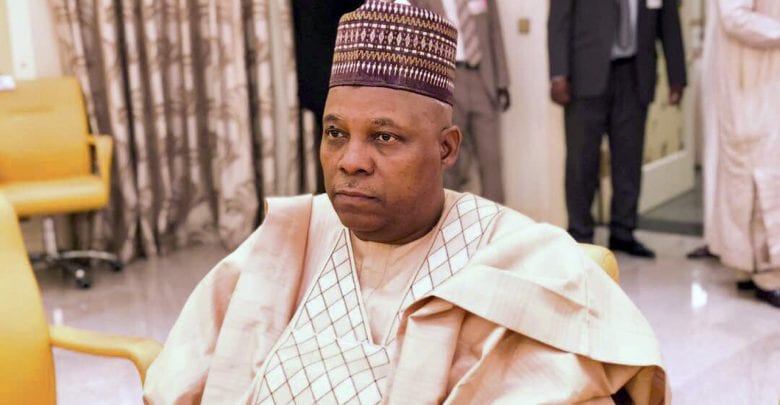
The Nigerian Presidency has stated that certain comments made by Vice President, Kashim Shettima at a recent book launch in Abuja have been ‘grossly misinterpreted’.
A statement on Friday, signed by the Senior Special Assistant to the President on Media and Communications (Office of the Vice President), Stanley Nkwocha, debunked claims that Shettima’s comments were veiled criticisms of President Abola Tinubu’s suspension of Rivers State Governor, Siminalayi Fubara.
POLITICS NIGERIA earlier reported that Shettima had spoken at the public presentation of “OPL 245: The Inside Story of the $1.3 Billion Oil Block,” a book written by former Attorney General of the Federation, Mohammed Bello Adoke, SAN, held at the Yar’Adua Centre, Abuja, on Thursday.
Controversy began when the Vice President referenced a historical episode during the Jonathan administration when there were alleged moves to remove him as Governor of Borno State at the height of the Boko Haram insurgency.
According to Nkwocha, shettima’s comments was majorly to highlight Adoke’s role and steadfastness as a public official. The statement read in full;
“The Office of the Vice President has noted with stern concern the gross misrepresentation of the remarks made by His Excellency, Senator Kashim Shettima, Vice President of the Federal Republic of Nigeria, during the public presentation of the book, “OPL 245: The Inside Story of the $1.3 Billion Oil Block,” by Mohammed Bello Adoke (SAN), the Yar’Adua Centre, Abuja, on Thursday, July 10, 2025.”
“Some news outlets have irresponsibly twisted the Vice President’s account of how the administration of former President Goodluck Jonathan floated the idea of removing him from office, then as governor of Borno State, in the most intense and critical phase of insurgency in the North East region of the country.”
“The sensational reporting disappointingly tried to erect a highly mendacious argument about the state of emergency declared in Rivers State and the subsequent suspension of Governor Siminalayi Fubara by His Excellency, Asiwaju Bola Ahmed Tinubu, GCFR, President and Commander-in-Chief of the Armed Forces of the Federal Republic of Nigeria.”
“We wish to state categorically that Vice President Shettima’s comments were made within the specific context of acknowledging the author’s past professional conduct during his tenure as Attorney General of the Federation. His remarks were historical references to events that occurred during the Jonathan administration, and constituted nothing more than an intellectual discourse on Nigeria’s constitutional evolution.”
“This rare moment of retrospection was purely illustrative, intended to demonstrate how our constitutional democracy has matured within the capacity to resolve complex federal-state tensions through established legal mechanisms.”
“For the avoidance of doubt, President Tinubu did not remove Governor Fubara from office. The constitutional action taken was suspension, and not outright removal. It was part of the measures implemented, including the state of emergency declared, in response to the grave circumstances surrounding the polity in Rivers State at the time. It is more so considering the unprecedented situation where the State House of Assembly complex was under demolition and the Governor was facing a looming threat of impeachment (outright removal from office) from the embattled members of the state legislature.”
“This cannot be compared with the situation in the North East region under the Jonathan administration, where violent non-state actors were challenging the sovereignty of the Nigerian state and required collective action from the central government and subnationals to eliminate the terrorists. President Tinubu’s actions were taken within the constitutional framework and in consultation with relevant stakeholders to preserve democratic institutions and maintain peace in Rivers State.”
“Our laws provide an explicit framework for comprehending these matters with the nuance they deserve. Section 305(1)(c) explicitly authorises measures to be taken when there is “a breakdown of public order and public safety in the federation or any part thereof to such extent as to require extraordinary measures to restore peace and security.”
“The steep descent into chaos in Rivers State had reached precisely this constitutional threshold, with daily incidents of politically motivated violence, systematic attacks on federal institutions, and complete paralysis of governance, creating conditions that no democratic society could reasonably tolerate. Worse still, it degenerated into attacks on national assets, according to credible security reports.”
“President Tinubu followed the constitutional process with honest precision. The President’s proclamation properly invoked Section 305(2), which was subsequently ratified by an overwhelming bipartisan majority in the National Assembly as mandated by Section 305(3).”
“This broad cross-party consensus demonstrates the universal recognition among our elected representatives that Rivers State had reached a point of constitutional necessity that demanded immediate federal intervention. Therefore, to interpret Senator Shettima’s observations as commentary on current affairs represents either willful misinterpretation or ignorance of constitutional discourse. The Vice President’s speech was focused on the importance of public officials documenting their stewardship and the eternal nature of accountability in public service. His historical references were made to illustrate the principled positions taken by public servants in the past, not a criticism of government policies.”
“So, the cynical attempt to distort academic commentary to appear as imagined criticism is not only deplorable but constitutes a reckless endangerment of our national cohesion. We emphasise that this administration remains unshakably united in its commitment to constitutional governance and the rule of law.
Vice President Shettima stands shoulder to shoulder with President Tinubu in implementing these difficult but indispensable actions to safeguard our democracy. We implore media organisations and political actors to abandon the destructive practice of wrenching statements from their proper context to fabricate nonexistent conflicts.”
